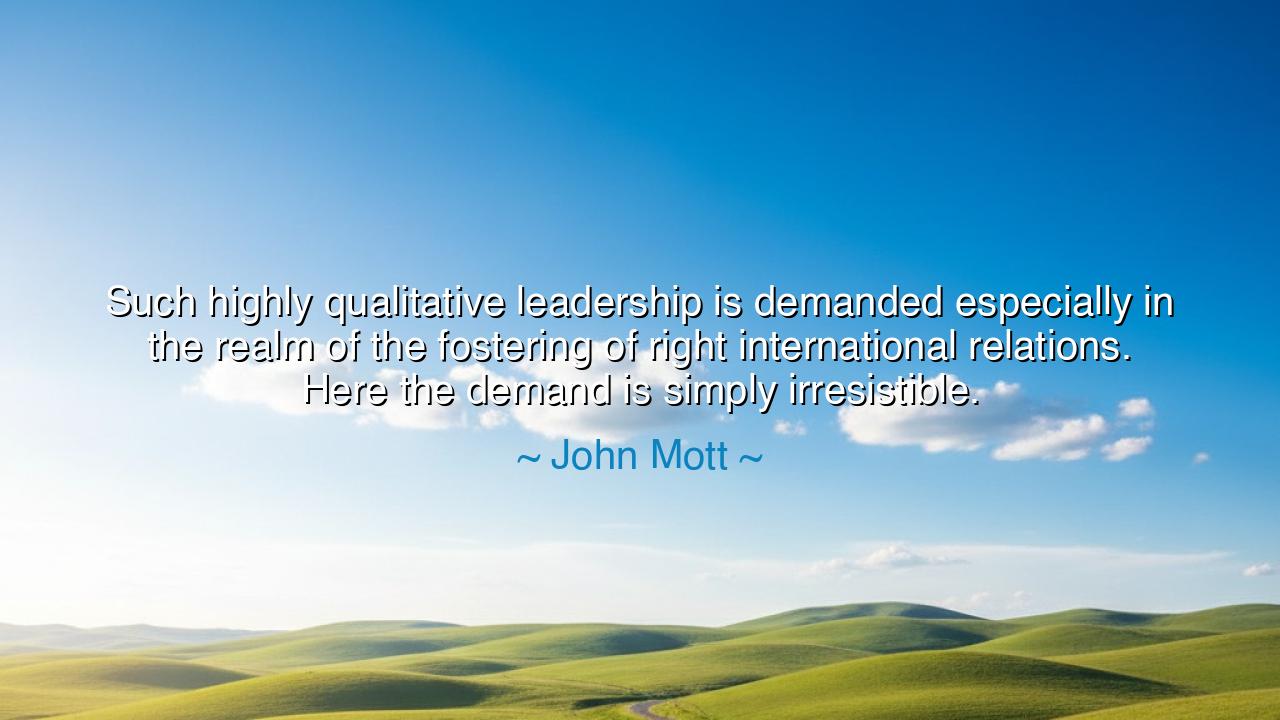
Such highly qualitative leadership is demanded especially in the
Such highly qualitative leadership is demanded especially in the realm of the fostering of right international relations. Here the demand is simply irresistible.






John Mott, a servant of peace and a builder of bridges among nations, once declared: “Such highly qualitative leadership is demanded especially in the realm of the fostering of right international relations. Here the demand is simply irresistible.” These words carry both urgency and prophecy. They remind us that in the dealings between nations, mere politics, ambition, or rhetoric are not enough. What is needed is the rare and noble form of leadership that is guided by wisdom, justice, and vision, not self-interest or pride. For when nations stand before one another, the stakes are not small—they are nothing less than war or peace, prosperity or ruin, life or death for millions.
The origin of Mott’s words lies in the turbulent age in which he lived. As a leader of the World Student Christian Federation and later a Nobel Peace Prize laureate, he saw the devastation of world wars, the rise of suspicion among nations, and the fragility of trust in international affairs. His life was devoted to unity, dialogue, and the moral awakening of peoples. In this context, his cry for “highly qualitative leadership” was not abstract philosophy, but a call forged in the fire of human suffering. He saw that only leaders of extraordinary character could resist the temptations of division and guide humanity toward reconciliation.
History itself bears witness to the truth of his words. Consider Woodrow Wilson, who after the First World War sought to bring forth the League of Nations. Whatever his faults, his vision sprang from the understanding that peace could not be secured by treaties alone, but required a new kind of international leadership—one that transcended the narrow borders of nationalism and embraced the destiny of humanity as one. Though his efforts faltered, the seed was planted, and decades later the United Nations arose as a living embodiment of this same principle. His example shows that without noble leadership, the machinery of diplomacy crumbles, but with it, hope can rise from ashes.
The demand, Mott says, is “simply irresistible.” This means that it cannot be ignored, delayed, or cast aside without terrible consequence. If nations choose leaders who are greedy, narrow, or blind, the world is dragged into conflict, mistrust, and ruin. But if nations are blessed with leaders of vision and moral clarity, the doors of cooperation open wide. The Cold War offers another example: in the tense days of the Cuban Missile Crisis, it was the steady hands and clear judgment of leaders like John F. Kennedy and Nikita Khrushchev that pulled the world back from the brink of nuclear destruction. There, in the realm of international relations, the quality of leadership determined the survival of civilization itself.
The deeper meaning is that international leadership requires not only skill but character. To manage relations between peoples is not to negotiate trade alone, but to carry the hopes, fears, and dignity of entire civilizations. Such a burden demands leaders who can rise above ego, who can see beyond short-term gain, who can honor truth, and who can extend trust even when mistrust seems easier. These qualities are rare, but without them, the delicate fabric of peace unravels.
The lesson for us is this: the world will always require men and women of extraordinary leadership, especially when nations face one another in suspicion and strife. Each of us, in our own way, participates in this demand. For international peace is not the work of statesmen alone; it is built also by citizens who choose wisely, who advocate for justice, who foster dialogue across cultures, and who demand from their leaders integrity and vision. We too must cultivate these qualities in our own circles, for peace begins with the choices of individuals and spreads outward into the life of nations.
Practical action lies close at hand. Study the examples of great leaders who fostered reconciliation rather than division. Teach the young that leadership is not domination but service, not arrogance but wisdom. In your conversations, in your communities, model the spirit of dialogue and respect that you would wish to see among nations. And above all, when the time comes to support or choose leaders, remember John Mott’s words: demand quality, demand vision, demand the kind of leadership that strengthens peace. For in this demand lies not only the hope of nations, but the survival of humanity itself.
Thus, let Mott’s declaration be passed down like a torch: the world cries out for noble leadership in international relations. The demand cannot be resisted, for it is written into the destiny of humankind. Either we raise up leaders who answer it, or we fall into ruin. But if we heed it—if we nurture, choose, and follow leaders of vision and virtue—then the nations will not perish, but flourish together under the banner of peace.






AAdministratorAdministrator
Welcome, honored guests. Please leave a comment, we will respond soon